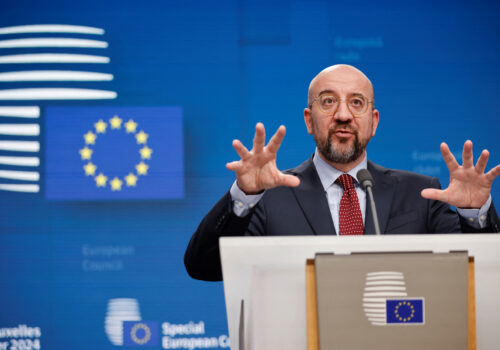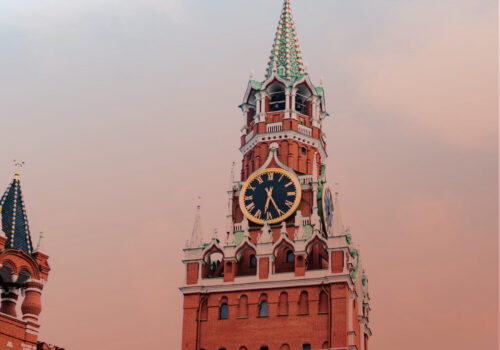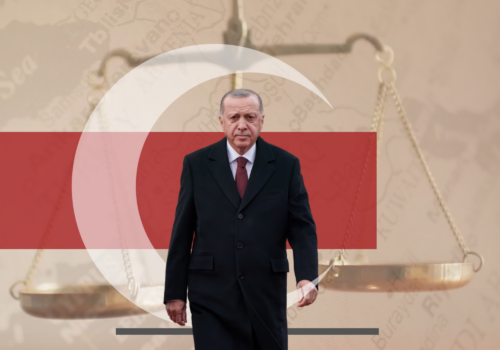Of the four great geopolitical tests facing the United States this year—in Europe, in the Mideast, with China, and over tech leadership—it is war in Ukraine that holds the greatest urgency and is of the most immediate geopolitical consequence.
To lose there—or even to settle for stalemate—would have influence on all other theaters. If Russia’s Vladimir Putin prevails, then China, Iran, North Korea, and others would accelerate their efforts to shift regional and global orders to their benefit. The failure of the countries supporting Ukraine, despite having a combined gross domestic product that is twenty-five times that of Russia, would deliver a generational wallop.
In that context, today’s op-ed in the Wall Street Journal by the Atlantic Council’s Stephen Hadley (a former US national security advisor) and Matthew Kroenig is a must-read for its diagnosis but most of all for its prescribed treatment.
“The war in Ukraine has reached a critical point,” they write. “The goal remains for it to emerge as an independent, prosperous country within internationally recognized borders and able to defend itself. That will require accelerating the delivery of advanced weapons and technology and pursuing a new military and diplomatic strategy to defend Ukrainian territory, increase Ukraine’s defense production, enhance its air defenses, and step up attacks against Russia’s supply lines and vulnerable military position in Crimea.”
They continue: “If the Biden administration embraces this approach, it could address congressional reluctance to provide more aid to Ukraine absent a clear strategy.”
One can only hope.
History will record that the Biden administration, fearing Putin’s potential nuclear escalation, adopted a policy of self-deterrence in 2022 and 2023, withholding the quality and quantity of weaponry that might have decisively shifted Putin’s war in Ukraine’s favor before his troops could dig in. Now, a rogue group of myopic House Republicans has blocked weapons deliveries at a time when Kyiv most needs them. (Here, all praise for the European Union in approving its own $54 billion Ukraine funding package last Thursday, overcoming its own rogue element, Hungary’s Viktor Orbán.)
The Hadley-Kroenig remedy is a smart one, as Russia’s war nears its second anniversary later this month. It deserves close reading by the Biden administration and members of Congress. The real success, however, can only come if US leaders across ideological lines remind Americans of history’s enduring lesson: dithering before despots can only produce disaster.
Frederick Kempe is president and chief executive officer of the Atlantic Council. You can follow him on Twitter: @FredKempe.
This edition is part of Frederick Kempe’s Inflection Points Today newsletter, a column of quick-hit insights on a world in transition. To receive this newsletter throughout the week, sign up here.
Further reading
Thu, Feb 1, 2024
Experts react: The EU just approved a 50 billion euro aid package for Ukraine. How will it impact the war?
New Atlanticist By
The breakthrough follows weeks of resistance from Hungary and comes as the two-year mark of Russia’s full-scale invasion of Ukraine draws near.
Fri, Feb 2, 2024
Russia Tomorrow: Five scenarios for Russia’s future
Russia Tomorrow By
A new Atlantic Council report explores five paths that Russia future might take in its future. What forces will shape Russia’s future?
Fri, Feb 2, 2024
Where Erdogan loses balance
The Big Story By
Turkey’s president has become a central player in world affairs by balancing competing interests. But in the conflict roiling the Middle East, he risks being left out of the game.
Image: Ukraine's President Volodymyr Zelenskiy listens to Commander of the Ground Forces colonel general Oleksandr Syrskyi as he visits a position of Ukrainian servicemen in the town of Kupiansk, amid Russia's attack on Ukraine, in Kharkiv region, Ukraine November 30, 2023. Ukrainian Presidential Press Service/Handout via REUTERS



